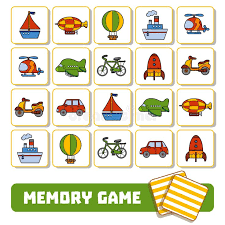Memory Game, are a popular and engaging way to challenge your brain while having fun. Suitable for all ages, these games not only entertain but also help improve memory, concentration, and cognitive skills. This article explores what memory games are, their benefits, popular variations, and tips for enhancing your memory game experience.
What Are Memory Games?
Memory games are designed to test and enhance a player’s memory and recall abilities. Typically, these games involve matching pairs of cards or remembering sequences of items, sounds, or images. The simplest form often consists of a set of face-down cards that players flip over to find pairs, while more complex versions can include multiple layers of challenges.
Benefits of Playing Memory Games
- Improved Memory: Regularly engaging in memory games can enhance your short-term and long-term memory. They encourage you to remember patterns, positions, and sequences.
- Enhanced Concentration: Memory games require focus and attention, which can help improve your overall concentration levels. This can be beneficial in academic and professional settings.
- Cognitive Development: For children, memory games can support cognitive development by encouraging critical thinking and problem-solving skills.
- Social Interaction: Many memory games are played in groups, promoting social interaction and teamwork. This can help build relationships and improve communication skills.
- Stress Relief: Playing games can be a fun way to unwind and relieve stress. Engaging your mind in a light-hearted challenge can provide a much-needed break from daily routines.
Popular Variations of Memory Games
- Card Matching: The classic memory card game involves a deck of cards laid face down. Players take turns flipping over two cards at a time to find matching pairs. This simple yet effective format is suitable for all ages.
- Sequence Games: Games like “Simon” challenge players to remember and replicate sequences of lights and sounds, enhancing auditory and visual memory.
- Digital Memory Games: With the rise of mobile gaming, there are countless apps and online platforms offering memory challenges. These games often feature different levels of difficulty and unique themes.
- Memory Puzzles: Jigsaw puzzles and other types of spatial memory games require players to remember the locations of pieces, which can enhance spatial awareness and memory skills.
- Word Games: Games like “20 Questions” or “I Spy” involve remembering and recalling various objects or concepts, which can also serve as effective memory exercises.
Tips for Enhancing Your Memory Game Experience
- Practice Regularly: Like any skill, improving your memory takes practice. Engage in memory games consistently to see significant improvements.
- Use Mnemonics: When playing memory games, try using mnemonic devices—associating words or images with the items you need to remember can aid recall.
- Stay Organized: Keeping your gaming area neat can help you focus better. An organized space minimizes distractions, allowing you to concentrate fully on the game.
- Play with Others: Engaging friends or family in memory games can make the experience more enjoyable and competitive, enhancing motivation to improve.
- Challenge Yourself: As you improve, increase the difficulty of the games you play. This could mean using a larger set of cards or tackling more complex sequences.
Conclusion
Memory games are more than just a pastime; they are a valuable tool for enhancing cognitive skills, improving memory, and providing a fun way to engage with friends and family. Whether you’re playing a classic card matching game or exploring digital options, the benefits of these games extend beyond entertainment. So, gather some friends, pick a game, and challenge your memory while enjoying some quality time together.




